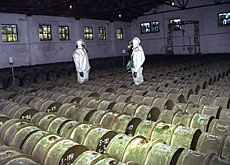
Calmy-Rey in Moscow to seal disarmament deals

Swiss Foreign Minister Micheline Calmy-Rey is paying an official visit to Moscow to sign two agreements on chemical weapons disarmament.
Switzerland is providing SFr15 million ($13 million) to help Russia destroy its stockpile amid fears that the weapons could contaminate the environment.
On Friday she will hold talks with her Russian counterpart, Sergei Lavrov.
Their talks will focus on bilateral relations, the situation in the volatile Caucasus region and international issues.
The visit is aimed at strengthening relations and cooperation between the two countries, according to a Swiss foreign ministry statement.
A number of issues have clouded Russian-Swiss relations in recent years, among them the 2002 crash of a Russian plane in Swiss-controlled airspace, and the corruption charges in Switzerland against former Kremlin property manager, Pavel Borodin.
Calmy-Rey’s agenda also includes discussions on technical and financial cooperation and developing economic and trade relations.
Chemical weapons
The two sides are due to sign two implementation agreements on chemical weapons disarmament projects.
Switzerland is funding the two projects to the tune of SFr15 million over five years in a move aimed at giving impetus to the faltering disarmament process.
Experts warn that Russia’s chemical weapons arsenals are a ticking time bomb.
Almost two-thirds of the global stockpile of 70,000 tons of chemical weapons originate in the former Soviet Union and are stored in Russia. Corrosion means that the risk of a chemical leak is high.
Financial assistance
Six plants are due to be built in Russia to process poisonous substances. The second of these is currently under construction in the southern Ural mountains.
Switzerland is donating SFr680,000 for a plant to monitor air, water and soil quality in the area surrounding the processing unit.
The plant should ensure that the destruction of nerve gases does not have any negative impact on the local population or environment.
A second project envisages the building of a transformer station to ensure a constant provision of energy to a reprocessing unit in Udmurtia.
UN convention
Seven years ago Russia signed the international Convention on the Prohibition of the Development, Production, Stockpiling and Use of Chemical Weapons (CWC) thereby pledging to reduce its chemical weapons arsenal by 2007. In 2001 the Kremlin extended this deadline until 2012.
Switzerland’s SFr15-million investment is part of a global programme initiated by the G8 countries to eliminate chemical weapons and other weapons of mass destruction.
In addition to funding reprocessing plants, Switzerland is also sponsoring public information, environmental and health projects, which are implemented by NGOs such as the environmental organisation Green Cross.
swissinfo, Alexandra Stark in Moscow
The aim of Foreign Minister Micheline Calmy-Rey’s official working visit to Moscow is to promote good relations and cooperation.
Two agreements on the destruction of chemical weapons are due to be signed.
These agreements fall within the framework of an international programme on the elimination of chemical and other weapons of mass destruction, targeted mainly at Russia.
Around 60% of the world’s 70,000 tons of chemical weapons are located in Russia and date back to the Cold War period.

In compliance with the JTI standards
More: SWI swissinfo.ch certified by the Journalism Trust Initiative





























You can find an overview of ongoing debates with our journalists here . Please join us!
If you want to start a conversation about a topic raised in this article or want to report factual errors, email us at english@swissinfo.ch.